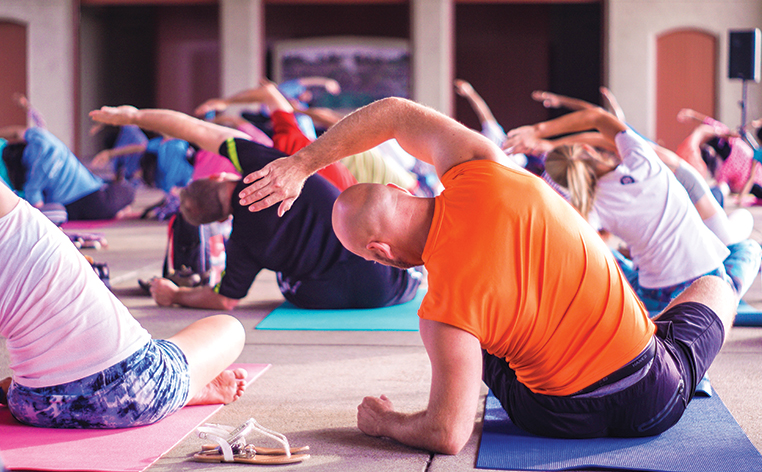There are many aspects that contribute to good mental and physical health
It can be difficult to maintain a healthy lifestyle while juggling work, study and other responsibilities. Your sleep habits, diet and physical activity contribute to more than just your physical health. Learn how these factors affect your overall wellness and how you can live as healthily as possible.
Sustainable Development Goals
Griffith University is aligned with the United Nation’s Sustainable Development Goals (SDGs) and is committed to advancing knowledge, innovation, and practices that promote holistic health and well-being.
I want to know about...
Managing stress

What can I do to cope with stress?
Stress is part of life, so you can’t eliminate it completely. Physical and mental stress shows up when we engage in life. However, remaining calm and focussed while chasing our aspirations, facing challenges and coping with life events can be very difficult. The methods that will have most effect on your ability to stay calm and focused in an ongoing long term way are simple.
- Exercise daily.
- Sleep minimum eight to 10 hours each night. Sleep is a superpower.
- Meditate daily.
- Eat healthily, drink more water and avoid alcohol, sugar and excessive caffeine.
- Say ‘no’ more frequently to commitments.
- Create a daily or weekly routine that prioritises your physical and mental health.

Exam stress
The effects of exam stress are similar to those we experience in other parts of our life. It is normal for it to show up when we challenge ourselves to go to university and do assessments and exams.
Your body doesn’t know ‘what you are doing’; it only knows that your body and mind are engaging in a challenging situation. Your mind reacts in the same way regardless. Hence, the strategies to find calmness and reduce the stress are the same: sleep, diet and exercise.
You can find further exam-specific stress reducing strategies among our self help resources, via the links below.

Study-life balance
Going to university requires students to juggle many different roles while also trying to be successful at study. Some of these different roles may include: work colleague, mother, father, partner, husband, wife, friend, team member or community leader. Study-life balance is about looking at the energy you put into the different roles in your life and keeping a balance in all areas that are important to you.
This is important as sometimes life can become unbalanced when things become really busy and when all of one’s energy is directed into a specific role or project. What often results is that one or some parts of a person’s life becomes neglected or overlooked, resulting in life becoming unbalanced.
Explore self help resources and other mental wellness tools to assist you with managing stress levels on the mental wellness page.

Managing work and other commitments
Most students have to balance work commitment and study load. It can often be challenging to manage that throughout the semester and year. However with planning, communication, boundaries and planned rest it is doable.
- Plan for challenging and busy study weeks. When do you have assessments and exams and when do you need to study hard? Consider working more before the busy periods to make up for the reduced income during these times.
- Communicate with your boss at work. Be clear about when you might need time off for busy periods.
- Make plans for rest. Consider taking time off work during uni-breaks so you can recharge, catch up on sleep or study.
- Say no to extra work or commitments, unless you really need it. It can seem easy to do an extra shift here and there. However, it can quickly lead to falling behind in your studies.
- The essential ingredient for balancing work and study will rarely be about time, but more about how you take care of your body and mind and staying healthy throughout the semester.
Considering a break from study?
If you are thinking about deferring your start date or taking a leave of absence from study, you can explore the process here. You can also speak to Student Connect if you have questions regarding taking a break.

Counselling and Wellbeing video resources
Griffith Counselling and Wellbeing have curated a library of helpful videos that cover a variety of wellbeing-related topics. Take a moment out of your day to practice mindfulness, relaxation, and more with Meaningful Minute, learn wellness and resilience tactics from Griffith counsellors, or brush up on stress-minimisation skills for exams.

Sleep habits

What is healthy sleep?
There is reliable scientific evidence on why sleep is important for many body and mind. Making sleep a priority is crucial for functioning well mentally and physically. Creating a consistent sleep routine will make your life better.
- Go to bed and wake up at the same time. Every day.
- Create darkness—reduce light and screens in the last two hours before bed.
- Sleep more than you think you need—get eight to 10 hours of sleep per night.
- Avoid alcohol and caffeine at least eight–10 hours before bed time.
- Meditate each night before bed.
- Exercise daily.
- Keep your room as cool as you can.

Sleep problems
Sometimes we can experience sleep difficulties during stressful periods in our lives. Even after engaging in healthy sleep routines, the disturbance to sleep is persistent and long term. This might be a sign that you need to address your sleeping difficulties, either with the help of a doctor or other professional.
You can find more information about healthy sleep habits and tips in our self help resources via the links below.
Eating healthy

What is healthy eating?
Learning about healthy eating can be overwhelming and confusing. Information, advice and marketing are all blurred together making it difficult to understand. However, most agree on a what general approach is helpful to eating better and feeling better. A sound simple nutritional approach is to cut out the majority of processed foods from your diet and focus on mostly eating whole foods.
- Eat whole foods—foods that don't have a marketing campaign or a list of ingredients. An apple or broccoli tree rarely gets air-time.
- Vegetables, protein and healthy fats are all good for you—every meal, every day.
- Sugar is rarely good for you.
- Eat food that satisfies, not stimulates you. Protein and good fats satisfies, while sugar stimulates you.
- Almost never eat heavily processed food.

Developing better eating habits
Changing our food habits can be very challenging. It takes time, effort and persistence. Know that it is a gradual process of learning about food, how certain foods make you feel and how they affect your body and mind. A simple approach is to add good habits over time while finding a sustainable approach to eating that makes you feel better.
- Curiosity—act with interest in what you eat or drink. Find out about ingredients.
- Body awareness—notice how you feel after you eat or drink something. If it makes you crash a few hours later, consider something different.
- Learn—understand what each ingredient you are eating actually is.
- Eat slowly—mindful eating and paying attention to when you are full is a good habit.
- Learn to cook—the biggest predictor of a person eating well is their food is cooked by a human and not a corporation.
Exercise and movement

How does staying active improve my mental health?
Exercise and movement have consistently shown to improve life for anyone. Exercise is the ultimate approach for improving health and wellness.
There are certainly too many benefits to list them all here, but staying active has been proven to improves stress, sleep, mood, memory, learning and concentration.
Exercising regularly can also reduce symptoms of anxiety, depression and other health difficulties.

Creating healthy movement
Starting the habit of exercise can be anything from an amazing feeling to a challenging one. The simple approach is to pick something you like or think you might like and do it—do it often.
- Find an activity that you like—anything that makes your body move. Do it daily. Mostly with moderate effort—sometimes hard.
- If you can’t do it daily, do it almost daily.
- Be consistent. It is hard to create an exercise routine, so once you have made it, stick to it!
Kicking unhealthy habits

Smoking cessation program
The Griffith University Quit Smoking Program can help you breathe easier by kicking the habit. Learn how your body will benefit and make an appointment with Health and Medical Services today.

Alcohol and other substances
If you or someone you know is suffering from alcohol or another substance addiction, there are counselling services available on campus as well as numerous other support options and resources external to Griffith.
Medical support

Health and Medical Services
Health and Medical Services is located at Brisbane South (Nathan) and Gold Coast, and offers a range of medical and ancillary services to students and staff of Griffith University.

Griffith Health Clinics
Whether you visit our student or professional (fully-qualified) clinic, you can be assured that you'll receive the latest evidence-based treatments from passionate individuals who are committed to getting your health back on track.











